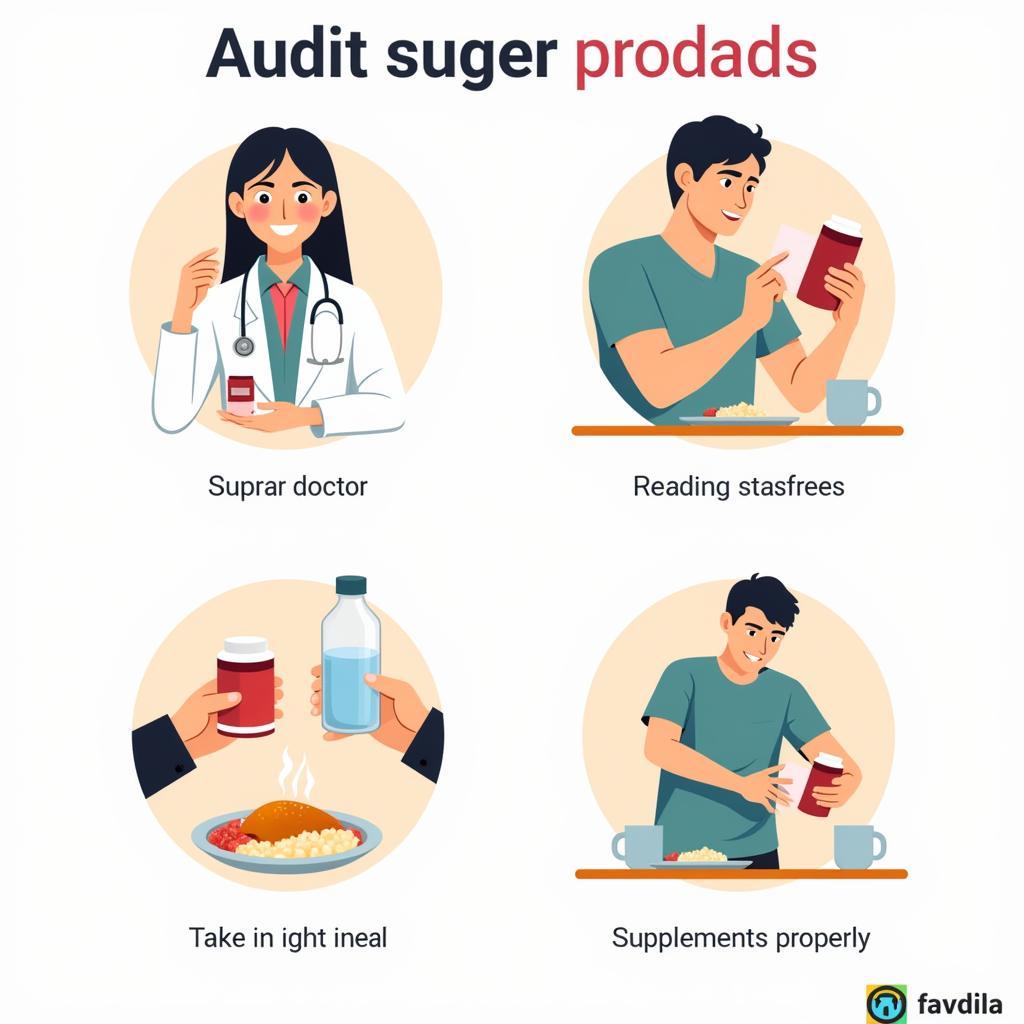Iron deficiency is a prevalent health concern in Pakistan, affecting a significant portion of the population. It can lead to a variety of health issues, including anemia, fatigue, and impaired cognitive function. While dietary changes are crucial, iron supplements often play a vital role in addressing this deficiency effectively. This article delves into the importance of Iron Supplements In Pakistan, explores the different types available, and provides guidance on making informed choices for optimal health outcomes.
 Common Iron Deficiency Symptoms in Pakistan
Common Iron Deficiency Symptoms in Pakistan
Understanding Iron Deficiency in the Pakistani Context
Iron is an essential mineral that plays a crucial role in various bodily functions. It is a key component of hemoglobin, a protein in red blood cells responsible for carrying oxygen throughout the body. When the body lacks sufficient iron, it cannot produce enough healthy red blood cells, leading to iron deficiency anemia.
In Pakistan, several factors contribute to the high prevalence of iron deficiency. These include:
- Dietary Habits: Diets low in iron-rich foods, such as red meat, leafy green vegetables, and legumes, are common.
- Malabsorption: Certain medical conditions, such as celiac disease and intestinal disorders, can impair iron absorption.
- Increased Demand: Pregnant women, growing children, and adolescents have higher iron requirements, making them more susceptible to deficiency.
- Blood Loss: Conditions like heavy menstrual periods and internal bleeding can deplete iron stores.
 Iron-Rich Foods Available in Pakistan
Iron-Rich Foods Available in Pakistan
Types of Iron Supplements Available in Pakistan
Navigating the world of iron supplements can be overwhelming, especially with the variety of options available. Here’s a breakdown of the common types found in Pakistan:
1. Ferrous Sulfate: This is one of the most commonly prescribed and affordable iron supplements. It is generally well-absorbed but can cause side effects like constipation, nausea, and stomach upset.
2. Ferrous Gluconate: This type is gentler on the stomach compared to ferrous sulfate and may be a better option for individuals with sensitive stomachs. However, it contains a lower amount of elemental iron.
3. Ferrous Fumarate: This form is also easily absorbed and has fewer gastrointestinal side effects than ferrous sulfate.
4. Iron Polysaccharide Complex: These supplements are known for their gentler absorption and reduced risk of stomach upset, making them a suitable option for many.
nikon dslr d3300 price in pakistan
Choosing the Right Iron Supplement: Factors to Consider
Selecting the appropriate iron supplement depends on individual needs and health status. Here are key factors to consider:
- Severity of Deficiency: The dosage and type of iron supplement will vary based on the severity of the deficiency.
- Tolerability: Some individuals may experience side effects with certain types of iron supplements.
- Medical History: Underlying health conditions, such as kidney disease or liver disease, can influence the choice of supplement.
- Cost and Availability: Iron supplements come in a range of prices, and it’s essential to choose one that is both effective and affordable.
Iron Supplements: Usage and Precautions
- Consult a Healthcare Professional: It is crucial to consult a doctor or a qualified healthcare provider before starting any iron supplement. They can determine the appropriate dosage and type based on individual needs.
- Dosage: The recommended dosage varies depending on age, gender, and health status.
- Timing: Iron supplements are generally best absorbed on an empty stomach. However, if they cause stomach upset, they can be taken with a small amount of food.
- Interactions: Iron supplements can interact with certain medications, including antibiotics and antacids.
 Taking Iron Supplements Safely
Taking Iron Supplements Safely
Iron Supplements and Dietary Considerations
While iron supplements can effectively address iron deficiency, they should be used in conjunction with a balanced diet rich in iron-rich foods.
Here are some tips for increasing dietary iron intake:
- Include Iron-Rich Foods: Consume foods like red meat, fish, poultry, beans, lentils, spinach, tofu, and fortified cereals.
- Enhance Absorption: Vitamin C aids iron absorption, so pairing iron-rich foods with vitamin C-rich foods like citrus fruits, tomatoes, and bell peppers can boost iron uptake.
- Limit Iron Inhibitors: Certain compounds, such as tannins in tea and coffee, can hinder iron absorption. It’s best to consume these beverages between meals rather than with iron-rich foods.
Conclusion
Iron deficiency is a significant health concern in Pakistan. Iron supplements, when used appropriately and under the guidance of a healthcare professional, can play a crucial role in addressing this deficiency and improving overall health. By understanding the different types of iron supplements available, considering individual factors, and adopting a holistic approach that includes dietary changes, individuals in Pakistan can effectively combat iron deficiency and its associated health risks.
FAQs about Iron Supplements in Pakistan
1. What are the common signs of iron deficiency?
Common signs include fatigue, weakness, pale skin, shortness of breath, dizziness, headaches, and cold hands and feet.
2. Can I take iron supplements without consulting a doctor?
It’s always best to consult a doctor before taking any supplements, including iron. They can assess your needs and recommend the appropriate dosage.
3. What are the potential side effects of iron supplements?
Side effects can include constipation, nausea, stomach upset, diarrhea, and black stools.
4. What is the best time to take iron supplements?
Iron supplements are typically best absorbed on an empty stomach. However, if they cause stomach upset, you can take them with a small amount of food.
5. Can I take iron supplements with milk or calcium supplements?
Calcium can interfere with iron absorption. It’s best to take iron supplements separately from calcium-rich foods or supplements.
6. How long does it take for iron levels to improve with supplements?
It can take several weeks to a few months for iron levels to return to normal with supplementation.
7. Are iron supplements safe during pregnancy?
Iron requirements increase during pregnancy. Your doctor can advise on the appropriate dosage of iron supplements during this time.
Need More Information?
Have more questions about iron supplements or other health concerns? We’re here to help!
Contact us:
Phone: +923337849799
Email: news.pakit@gmail.com
Or visit us at:
Dera Ghazi Khan Rd, Rakhni, Barkhan, Balochistan, Pakistan.
Our customer support team is available 24/7 to assist you.